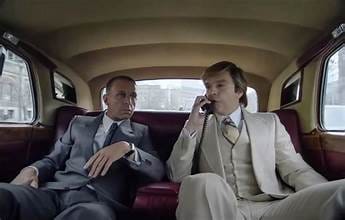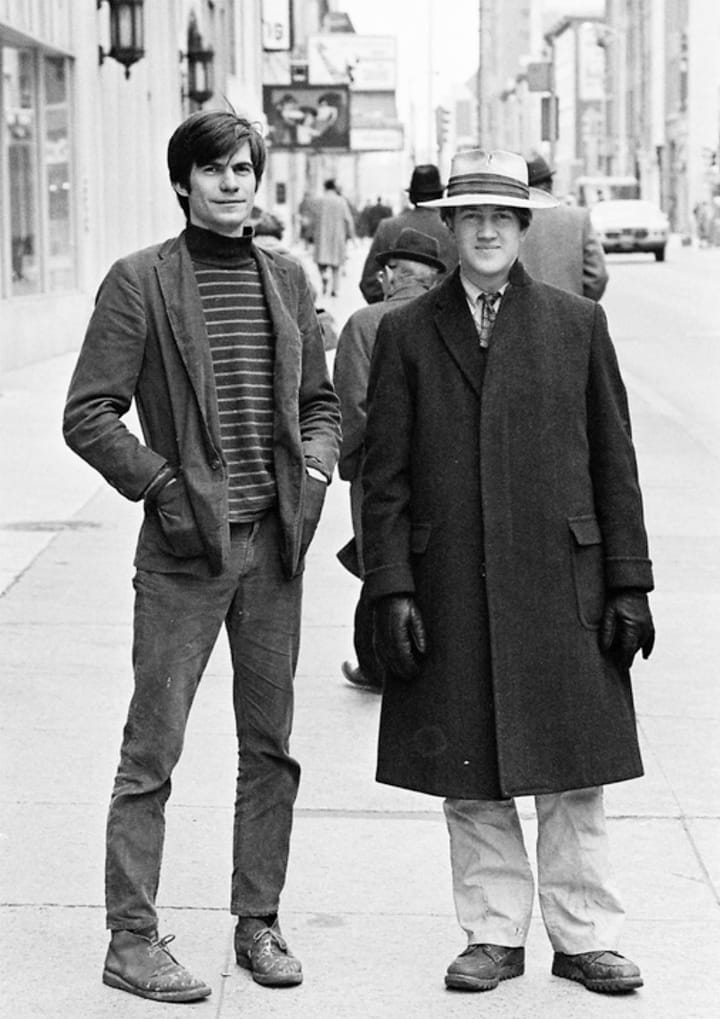Mad Profs

There’s no doubt that that pesty buzz word `identity’ factored heavily into this year’s Oscars. It’s there most conspicuously in Cord Jefferson’s win for adapted screenplay for American Fiction, whose story of Jeffrey Wright’s moody professor Thelonious `Monk’ Ellison begins with the character abruptly defenestrated from his university teaching career. It took but one word (albeit a radioactive one), scrawled in a book title on his classroom whiteboard. Triggering a vocal female student, the miscue becomes the actionable offense leading to a forced leave of absence. We watch it happen with condescending brevity to the immaculately cast Wright--a very proper Oscar nominee who stood only the barest chance to outpoint Cillian Murphy’s portrayal of Oppenheimer.
Similarly perfect casting and a lock for his nomination as Best Actor candidate was Paul Giamatti as boarding school instructor Paul Dunham in Alexander Payne’s The Holdovers. He’s induced to take a leave of absence over his martinet teaching style, as compounded by his odd fishy odor and his angrily sarcastic wit. (Though well within the actor’s skill set is the unveiling of an ultimate, trammeled humanity.)
Joining the above two as a Golden Globe nominee, though he proved an unrealistic contender for an Oscar nom despite owning a win for Leaving Las Vegas, was Nicolas Cage as entomology professor Paul Williams. He fretfully battles irrelevance—and then a sudden, tumultuous notoriety—in Kristoffer Borgli’s pop culture satire Dream Scenario. Paul’s a beta male wishing to be an alpha, as Borgli has noted. Said Norwegian-born arrival eschews the other directors’ heartening plot resolutions to land his own biting societal critique. (Murphy’s genius physicist is the only one not to seek mere publication for his work. But he flashes his own pride when it’s suggested he “couldn’t run a hamburger stand”. Indeed, Oppenheimer replies, “I couldn’t. But I could run the Manhattan Project.”)
Cage’s Paul discovers the theme--there’s no real need to strive for actual accomplishments. As Borgli told IndieWire, Paul’s abrupt rise to a nightmarish fame carries the lesson, “You don’t have to achieve anything, you just need to go hard with a personal branding and making yourself the product.”
Borgli’s casting coup was the result of tapping into Cage’s inner needs. As the director told the audience after the American Cinematheque screening of the film at Santa Monica’s Aero, it was producer Ari Aster who sent Cage the script: “And then 24 hours later we had an email from him as to how he related to the character--that he felt that he had gone through a lot of the same things--how his image in the world as was out of his control…and he’d become a sort of mythical icon in the world. I think he got to exorcise some of those demons with the script.”
For four such distinctive films, these tales of professorial woe share overarching tropes of broken aspirations. Giamatti’s Paul can’t get his obscure monograph completed; Cage’s Paul can’t get his ant study into the science glossies; Wright’s Monk has a thoughtful novel festering unbought while charlatans’ slipshod screeds showing black stereotypes bag prizes and big bucks; and Oppenheimer faces the resistance that is epitomized by the statuette Robert Downey, Jr. took home as the physicist’s determined nemesis Lewis Strauss.
For Monk, all is transformed when his prankish parody of a gangster saga blows up into a bestseller with a screen version looming. The nuanced topicality of Jefferson’s satire did indeed steer the film towards success with the Academy, partly by grace of its examination of current front-page obsessions. In a cracked-apart academic realm that was once an ivory tower, real-life learning has become a combative tableau of red-versus blue donnybrooks that bring shaming and ousters of not only freely-speaking roguish profs but any educators, up to the level of university president who speak “inartfully".
Each of the cautionary tales is enriched with family-centric subplots. Monk’s return to his combative family’s longtime seaside retreat ushers in gripes and grim reminders of the divided clan's volatile history. (“This family will break your heart”, his troubled brother –and Supporting Actor nominee--Sterling K. Brown tells Monk’s new girlfriend).
As winner of the Toronto Film Festival’s People’s Choice Award, American Fiction marked a celebrated arrival for sometime journalist and writers’ rooms veteran Jefferson, and is widely touted as the summiting achievement of Wright’s celebrated filmography this far. Its almost mischievous overlap with the writer-director’s own personal history, given Jefferson’s status as a mixed-race creative type in Hollywood, gives the filmmaker room to make spirited mock of posturing cultural products—in this case the amusingly quoted two novels that gain their punch from crude black(ish) stereotypes. As Monk bitterly confides to his agent (a wonderfully sly and mostly cynical John Ortiz,) “The dumber I behave the richer I get.” (Cue Jefferson’s Oscar acceptance speech chiding the industry for its focus on blockbusters.)
Giamatti’s wall-eyed, haplessly odiferous schoolhouse demagogue is also too smart for the room and is punitively assigned to shepherd a handful of unappreciative preppies (“snarling Visigoths,” he dubs them) through a winter break. Like Monk, Cage and Oppenheimer, he has a nemesis—a former student-become-headmaster who patronizes him –and manages to run into a still-more-painfully recalled fellow Harvard grad who’s a stark reminder of his bedraggled career. (Thanks to the troubled but kind-hearted student who becomes a protégé, the story finds a way to shake hands with Paul’s hard-won tenderness.)
Cage’s Paul is not surprisingly a typically fresh and bold interpretation. The actor has been voluble in crediting Borgli’s script as one of just five flawlessly-written roles he’s encountered, and the character, via a mysterious invasion of his people’s dreams, progresses from befuddled if vain science nerd into a specter in many sleepers’ feverish imaginings. In one case he’s even (hilariously if cringe-ably) a kind of sexual avatar. (Look for a career boost for comedienne-with-chops-and-razz Dylan Galula as the hilariously sex-positive Molly, whose satirical edge is matched by Paul Cera’s oblivious if zealous agent type). Paul’s odd passivity and mis-timed bodily functions send Molly from randy to stricken in a sequence that Borgli has named the ironic heart of the Paul arc, as events, some imaginary, slide us into a wider social critique. The New Yorker’s Anthony Lane found the turn “one of Cage’s most fulfilling ventures…because it allows him to trade so richly in the unforeseen,” and Justin Chang found amidst the film’s “what-the-hell weirdness” a “fiercely memorable loser, a sad sack who bristles with recognizably Cageian energy.”
Ultimately each one of these four resourceful actors reminds us that attention must be paid to our savants as they strive for some form of recognition in their chalk-dusted, often ego-bruising trade. (“I turn to the blackboard,’ says Oppenheimer in concluding the above scene in Nolan’s first-person script, “Take up my chalk.”) It seems that like us all, they simply wish to be seen (if only by Einstein in one case.)
It’s not for nothing that Andy Warhol’s famous observation has gone from essayists’ wheeze to a truism—“In the future everybody will be famous for fifteen minutes”—and all credit to Murphy for picking up his statuette with real humility. Each of these professors has done the work of an actor’s lifetime. Could there be better proof of their mutual admiration that Cage’s onstage moment introducing Giamatti by detailing a Method quirk in which Giamatti wore a soft contact to effectively render one eye lazy, to which Cage added, “Would I have done that? Hell yes!”





Comments ()